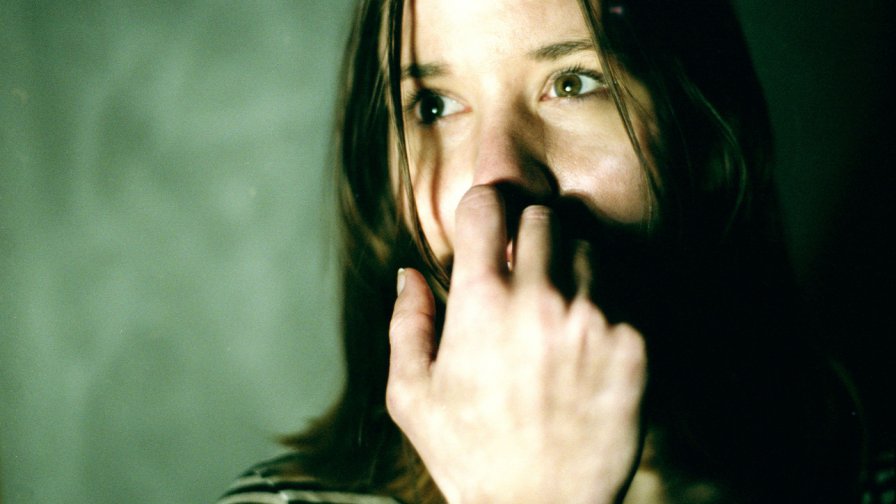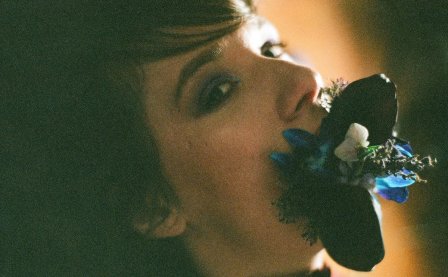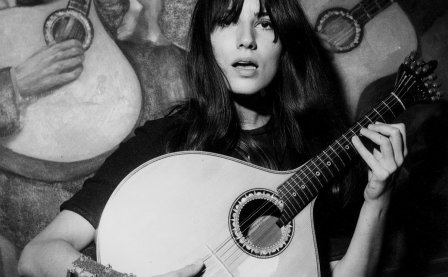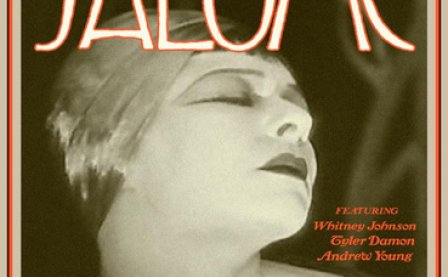Single moments can be fundamental in altering a person’s being. A musical perception often changes over time, but sometimes an event can override one’s aural mentality completely, and push them in a different direction. In most cases, this event is often only told well after the fact, if at all. But sometimes we are able to witness, live, a fixed moment wherein a person begins to change. Sometimes that person can witness it immediately, like a reflection unseen but felt.
Such is the case with Haley Fohr, also known as Circuit des Yeux. Several key events in the last year or so, in the aftermath of her seminal album Overdue, have affected her directly and immediately, particularly at the Hopscotch Music Festival in 2014. These small moments in time would ultimately influence the internal struggle that one can feel in her follow-up, In Plain Speech. From visiting the experimental haven Lisbon to visiting suburban farmland that felt familiar, the things we discussed at a Chicago café in late May before our own respective tours in Europe began to flesh out an album that, while at times is distanced from reality, is nevertheless touched by it.
You’ve cited in recent posts and interviews your performance at Hopscotch being this sort of turning point to how you viewed music. What was it that shifted, at least on a musical level?
I think it was more internal than musical. It was more of a state of mind. The way I felt when I played changed drastically. My perception of the audience and the world around me changed. So that was the first step, and that evolved into the music and sounds changing.
What created that internal mindset?
The previous mindset or the post-Hopscotch?
Why don’t we go with both?
I can’t really pinpoint it on one certain thing, but as an artist, I see every artistic outlet as an opportunity to express myself. Every show, I was traveling around solo by myself, and I was really throwing myself into my music in a kind of cathartic way. After every set, I’d be completely torn apart. I would lose my voice, I was getting sick, but I just felt like there would be sometimes 20, sometimes 2,000 people in a room and I felt like I needed to conquer that space. It’s physically impossible to do that, but I was trying for so long, and a lot of it was me snapping into this place where other people couldn’t reach me. After the Hopscotch show, I realized I was not getting where I need to be, and I was able to hear people and their comments. My worldview opened up, and I understood that I shouldn’t be lighting myself on fire in front of people every night because it’s not helping them. It wasn’t helping me either.
With that in mind would you say that accessibility plays a greater role now?
Oh, no. Not at all. I don’t consider accessibility at all. It’s a blessing and a curse to follow my muse, and I can’t say it’s paid off in a really huge way by any means. But I do think that In Plain Speech is a strange record. It takes effort to really listen to it. So I’ve been surprised and overwhelmed by the positive response thus far.
I think tension for the sake of tension is silly, but it is powerful if you’re trying to get people to think and consider change. So I’m trying to work within a large spectrum of feelings and emotions.
How much were the prior tours also influencing your music going in, especially when supporting acts such as Xiu Xiu?
It’s been a bit of a challenge for me as far as supporting acts are concerned. Everyone that I’ve opened up for has been an awesome person and a great musician. But my music I feel is too hard to pinpoint. It’s too noise-y for singer-songwriters, it’s too straightforward for the noise people. So I’ve been opening for an eclectic amount of different kinds of people. And there is this external pressure to conform to an audience’s palate. I’ve played showcases where someone’s come up to me and been like, “Well, so, technically, this is a loud noise showcase, so if you can kind of just be loud,” or, “So you’re playing in a conservative town in Spain opening for Bill Callahan, maybe you shouldn’t play that last song.” I’m not going to do that, and that comes with repercussions. People walk out, people don’t buy your album, whatever. But you’ve gotta be you.
How has it affected my music since then? Well, for this record, I want my live show to embody it. Can’t do that with one person, so I’m gonna spend some money and have some people on the road. That’s not something I could ever afford or thought of doing previously.
Hmm, that’s something I’d like to go into later. Though I’m curious, where was that show with Bill Callahan?
I played a couple places in Spain like that. So, the Bill Callahan tour was amazing. We played in these beautiful theaters across Europe. A few of the places we went to, people were subscribed to a monthly event at the theater. So that happened to be the event that month. Sometimes, we’d finish a song and there’d be absolutely no applause. Or, I would look up at the audience during the performance and see someone in the hallway emulating what I’m doing, imitating me kind of. There were also towns where I was really well-received. Like, Lyon was beautiful. People were really welcoming there. I just don’t think certain people were ready to hear that.
You mentioned before that there was a little bit of a challenge. What were you up against putting this material together in the last fall or winter?
It was mostly myself. I have a pretty pessimistic mindset and am pretty introverted naturally. This line of work I’m in, it forces you to be on stage under lights communicating with people you’ve never met before all the time. So it has been a bit of a challenge. But, I’m really trying to change my internal mindset and my relationship with people in the world. It was a really uncomfortable record to write and to face those challenges to try something new. There was a lot of fear and self-doubt.
It’s a great responsibility to stay open and sensitive. With the live shows and sometimes having bad reviews or critical thoughts, it can create a lot of callousness and resentfulness. So I try to let it go and stay tender to the world around me.
Listening to this record, the first thing I noticed is that there is a lot of fluidity at least in the first half until “Guitar Knife.” There was just this one singular movement constantly shifted. Is that the way you wanted to be heard?
Yeah. It was intentional. I got bored with the song recently. I’ve just been bored with verse-chorus songs, honestly. I’ll probably do more stuff like that in the future.
So you prefer more of a long-form strategy?
I like sound design and cinematic pieces. A cohesive whole. I like albums that are a journey. Like with psychedelic records from the 70s and 60s. They could do these studio tricks where things could never be recreated on stage. Playing the tape backwards or adding phaser and delay, slowing down by two. Stuff like that.
Writing liner notes the listener’s supposed to read between songs.
[laughs] I could get into that.
Would you say in retrospect, and in relation to what you experienced performing live, would you say that some of the structures are a way to react against the audience?
Not anymore. I think I was doing that live for a little bit. I would just get really loud and abrasive. But it was the opposite of that. I could have made a record that was a reaction to that and try to combat whatever the audience was saying. But it’s a quiet and inviting response, and it’s trying to open up, not push.
What pushed you to that direction?
There’s cycles to emotion. At first, I felt…well, not every audience has been like a challenge either. I’ve played so many places that are always inviting and fun to go back to. That’s what makes touring great. If it was bad all the time, I would stop.
I feel like a form like painting or something is a little more of a one-directional art. But with music, it’s so cyclical with the dialogue. There’s interviews and reviews, and it’s all floating around everywhere. The audience listening is just as much a part of it as I am. I want to be inviting and unite people, not divide them. I think tension for the sake of tension is silly, but it is powerful if you’re trying to get people to think and consider change. So I’m trying to work within a large spectrum of feelings and emotions. If it was just loud pummeling, I don’t think people would be as receptive, and I certainly don’t like to converse with people that way.
I’ve played showcases where someone’s come up to me and been like, ‘Well, so, technically, this is a loud noise showcase, so if you can kind of just be loud,’ or, ‘So you’re playing in a conservative town in Spain opening for Bill Callahan, maybe you shouldn’t play that last song.’ I’m not going to do that, and that comes with repercussions. People walk out, people don’t buy your album, whatever. But you’ve gotta be you.
So you would like to see your engagement as a sort of conversation?
For this record, certainly.
It’s something I try to do with the interviews I have. But it can be difficult the way the press cycle works for artists. Had a few artists reject an offer because they were just too tired of it.
It’s a weird chore to add onto being a musician. Most people who make music, I find, are not the most conversational or social.
Would you say that you felt a political temperament in developing this record, or is that something that’s been imposed on others?
It’s not explicitly political, but there is so much going on in America when I was writing this, how could it not be a little bit in there? It’s not my agenda to enter a political scene, but I think inactivity in America in general is a problem. So, as a broad statement, that can be taken in a political sense.
Now I saw the video for “Do the Dishes.” What I wanted to know was, where was that shot?
Greenview, Illinois, which is a suburb 40 minutes outside Chicago. And it as a friend of mine’s parents’ house. They were out on a weekend trip. We took advantage of the nice natural sunlight.
Have they seen the video?
Yeah, they like it.
That’s cool. I mean, it’s an interesting element, the setting. It interests me on a personal level because, it’s definitely a suburb, but at the same time it has this very rural sort of sense. I grew up in the suburb in the state of Rhode Island, yet I was surrounded by farms. So, it feels like you’re so close to civilization, but you’re not. You get this weird sense of isolation. I felt that you were trying to project that in the video. Maybe I’m wrong, but there’s this feeling that you’re not completely there with the world. Does that make sense?
Yeah, I like your interpretation. I think that’s fantastic. I like to leave it a little open-ended. But I had a similar upbringing where I was surrounded by these factories but also farm animals. It was a strange little area: Suburban, but there’s patches of cows. But yeah, isolation is something that we all deal with, whether it’s due to distance or internal dialogue.
Going into the tour, you were discussing before bringing in some people. What do you intend to recreate by doing this?
For the record, live? Well, I am doing a tour in August and potentially all of September, a couple months. So that’s going to be a full band, and it’s going to be very close to the record. It features a lot of people that collaborated with and performed on the record: Robert Fry, Whitney Johnson, and Adam Luksetich, who contributed to parts of In Plain Speech. Matt Jencik, who works Reckless Records, plays for Implodes and a few other bands, is a really great bass player, and will be doing that and synthesizer. It’s really fleshed-out. We’ve practiced a lot, which is really awesome because that’s how I like to jive.
But I am also going to have to do some solo touring due to finance. At first I was a little resentful or upset about it. But I’m embracing it and I’ve been practicing a lot. I’m completely reinventing the songs because I can’t do all of that for one person, and I refuse to bring a laptop and press play. That’s not really my thing.
My worldview opened up, and I understood that I shouldn’t be lighting myself on fire in front of people every night because it’s not helping them. It wasn’t helping me either.
You know, that’s kind of interesting, the back and forth between the matter of “bring laptop, press play.” Like, for example, John Maus simply plays back his tracks with his vocals in it and sings over that.
So it’s like karaoke to his own tracks?
Yeah. It’s strange to justify.
It’s like a performance art. The computer is an instrument after all, and I use it to write records. But it’s just hard for me to do that in a live setting. There’s this energy when you’re on stage, and that’s just hard to capture on a computer personally. I think an artist should do whatever feels best for them. But for me, it’s a much more visceral and real if I’m strumming a guitar and in control of the sounds, physically, with the heaviness of my fingers and the loudness of my voice.
When we began this discussion, we had talked about Lisbon a little bit. So, I remember seeing a post from last year about you going to ZDB and having this memorable experience. It just fascinates me because the city has become this sort of haven for experimental, DIY and noise, with a lot of artists coming in and raving about it. What is drawing all of us to that place?
It’s a pretty simple answer. There’s two people that run a few venues and started a collective. Then, great things spread quickly thorughout the world. For me, it was Sergio, who runs ZDB. It’s amazing. It was built for musicians. They thought about what musicians need when they’re traveling. It’s got free room and board, it’s got a great stage. My friend Alex from Dirty Beaches was also living there at the time. So just having a really good friend to reconnect with on the road also added to the experience. Plus, ZDB is magical. It really is. All those people visiting there and doing all those records, it’s just evidence of that. It’s inspiring because anyone can do that anywhere.
But yeah, I love it out there, and I’m really glad to have fallen into that experience.
You know, there’s another place like that in Lyon, called Grnnnd Zero…
Ohmigosh, Grnnnd Zero! That place is fantastic. I played back in 2009, then they shut down for a few years. But they’re back it. The place has a similar ethos to ZDB. I think ZDB is a little more long term. They host bands for months at a time and do residencies. Grnnnd Zero is more a tour stop. Still, it’s very special.
It’s such a weird thing in that things are far more sporadic here than out in Europe.
For DIY venues? Yeah, the government cracks down on that. You ever talk to Sam from Boston Hassle? They’re one of the few people I know that is trying to do it right, getting politcally involved. They run a few venues, throw on these underground shows. They have a monthly newsletter and show calendiar. They print 5,000 a month of those, so it’s widely circulated in Boston. Yeah, he had to get up at 8 am to meet the new mayor and try to get on his good side. It’s crazy. He’s going to court every other week for putting on a show. It’s the government shutting it down. I mean, last year in Chicago, they shut down the whole DIY scene during the NATO conference, just because of “potential terrorism.”
I just don’t think music should be considered a crime. And I think having a show in a house is not something the government should be wasting their time on. Music unites people, it’s a force of good.
But yeah, even then, you have stuff that’s happening in places like San Francisco and Oakland where the DIY scene is being swept aside by other forces.
It’s sad. I think it’s just the nature of DIY spaces in America. They all have an expiration date. It’s just a matter of when. And it’s always the bigger man, the cash flow, the dollar sign that brings them down one way or another.
I guess that appreciation is something that people lack. Some people get really over the top with it, like the New York scene, the DIY spaces that are being shut down. It’s like “Guys, we get it, but you’re being overdramatic about it.”
Well, the irony of Death by Audio shutting down was the fact that it was a music publication that bought them out, and that publication posted a blog article explaining how to start your own DIY space. That is just insulting.
You’re right about that. I just think that DbA was seven years old, and people are treating it like it was some institution. Institutions are built over decades, not a small number of years. People have a smaller sense of time than they used to.
Sure, that’s definitely true. I think seven years is a long time for a DIY place, though. I was sad to see it go.
[Photo: Julia Dratel]
More about: Circuit des Yeux



